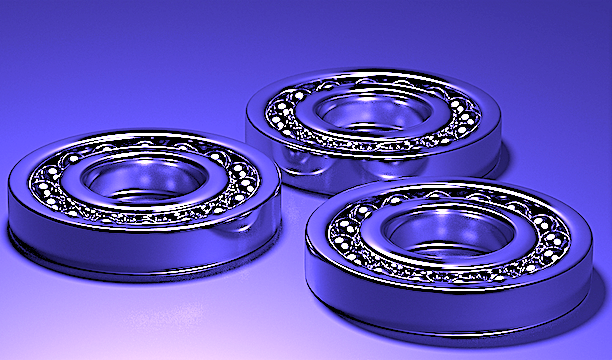Angular contact ball bearings are used in millions of pumps and many other fluid machines. The rolling elements in these bearings are separated by cages. The main function of those cages is to maintain equal distances from ball to ball and to do so with minimum friction.
The most widely used cages are made of either stamped steel, polyamide 6.6, or brass. Riveted steel cages are also available, but they should not be used in centrifugal pumps. In the event a rivet head were to pop off and find its way into a bearing raceway, instantaneous bearing failure could result.
The American Petroleum Institute (API) advocates use of bearings with the suffix “M” for centrifugal pumps in petrochemical plants and oil Refineries. Suffix ”M” is the code letter for machined brass cages. Unfortunately, if there is ball skidding due to light loading, the brass will smear and cause problems. It’s worth noting that industries in Japan, as do those and many other industrialized countries, prefer suffix “P” bearings. Their cages are made from high performance plastics. Suffix “P” bearings are often specified because they are low in friction and also cost considerably less than the “M”-style bearings.
So why does API favor M-cages? There are several reasons, all summarized by observing that M-cages are more tolerant of unfavorable conditions.
Unfavorable bearing conditions can be introduced by poor installation procedures, for one. When excessive heat (temperatures greater than 260 F) is applied while mounting a type “P” bearing, the cage will soften or melt. Excessive heat applied to the “M” cage will cause problems only when the heat significantly exceeds 300 F. The M-cage is better at tolerating degraded oil, and accommodating excessive bearing clearances, mating parts out-of-tolerance, and similar deviations. All of those deviations, however, can be avoided by proper reliability management.
The experience with less expensive P-cages, though, is excellent at plants that also use high-performance bearing-housing seals; follow bearing installation instructions first formulated in the early 1900s; implement the best available lube application method; and take the training of shop personnel seriously. As one of my mentors said 50 years ago: “If you can’t do it right, don’t do it at all.” To which we might add that if “it”is done right, it lasts longer and increases a craftsperson’s self-esteem. Occasionally, it may even save money.TRR
Editor’s Note: Click Here To Download A Complete List Of Heinz Bloch’s 22 Books
ABOUT THE AUTHOR
Heinz Bloch’s long professional career included assignments as Exxon Chemical’s Regional Machinery Specialist for the United States. A recognized subject-matter-expert on plant equipment and failure avoidance, he is the author of numerous books and articles, and continues to present at technical conferences around the world. Bloch holds B.S. and M.S. degrees in Mechanical Engineering and is an ASME Life Fellow. These days, he’s based near Houston, TX. Email him at heinzpbloch@gmail.com.
Tags: reliability, availability, maintenance, RAM, pumps, bearings, bearing cages, American Petroleum Institute, API
.



